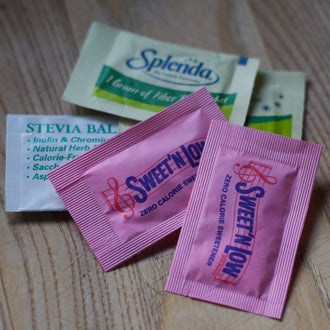A direct association between artificial sweeteners and cancer has been disproven recently by the US Food and Drug Administration, but is it still a factor because these products can lead to weight gain?"
Artificial sweeteners are used as a replacement for sugar in food and drinks, as they are very sweet and contain fewer kilojoules (energy). There are several types of artificial sweeteners, including aspartame, sucralose, cyclamate and saccharin. The evidence suggests that artificial sweeteners (saccharin and cyclamate) found in ‘diet’ drinks and some foods are unlikely to cause cancer.
Saccharin is used in tablets that substitute for sugar and is sometimes contained in diet soft drinks from fountain dispensers to help extend shelf life. In rats, high doses of saccharin have been shown to cause the formation of bladder stones that can lead to bladder cancer. However, saccharin consumption does not appear to cause the formation of bladder stones in humans. If saccharin does increase cancer risk in humans, it would be at doses many times greater than amounts typically consumed.
Large population studies have not reported increases in bladder cancers among people using saccharin, and the US National Toxicology Program has removed it from the list of established human carcinogens. In Australia, Food Standards Australia New Zealand (FSANZ) sets acceptable levels for all types of additives including artificial sweeteners. These levels are regularly reviewed and adjusted by FSANZ.

